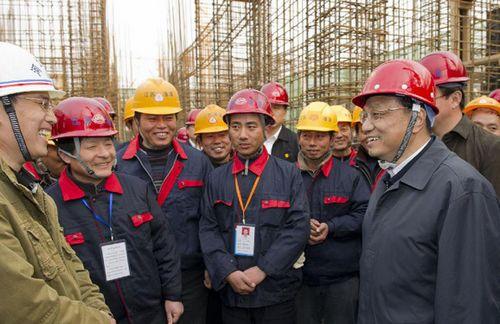
Chinese Vice Premier Li Keqiang (R, front) talks with construction workers of an affordable homes community in Langfang, north China's Hebei Province, Nov. 25, 2011. Li made an inspection on the construction of affordable homes in Langfang on Friday. [Xinhua/Huang Jingwen]
After China has met its target of starting construction on 10 million affordable housing units this year, more emphasis should be laid on construction quality and fair distribution, Vice-Premier Li Keqiang said.
All construction materials used in affordable housing should follow the same standards of commercial housing, Li said, adding that constant checks on affordable housing construction must be carried out.
"Affordable housing is a project of conscience and housing quality is the lifeline," Li said while inspecting an affordable housing construction site in Langfang, Hebei province on Friday.
Fair distribution is another key to ensure the success of the plan. Li said that central and local governments should speed up the establishment of a national information system covering personal housing assets to lay the foundation for fair and open distribution of subsidized housing.
To contain the rapid increase of property prices and provide low- and middle-income households with affordable housing options, the central government has promised to build 10 million affordable housing units this year and another 26 million in the next four years.
While many members of the public are enjoying the benefits of the program, reports about the poor quality of low-rent housing projects and scandals that involve offering subsidized housing to the affluent have frequently made headlines.
In 2010, serious flaws were found in six half-finished subsidized apartment buildings in the Mingyuewan community in the Daxing district of Beijing.
Inspectors found that the cement being used was substandard, and the local government ruled in early October 2010 that the structures had to be demolished.
While making a report to the top legislature on Oct 28, Minister of Housing and Urban-Rural Development Jiang Weixin admitted that some "hidden defects" had been found in the construction of government-funded houses, such as using substandard steel, although the overall quality of the structures remained "under control".
Ji Rujin, deputy director of the Real Estate Research Institute at Tsinghua University, said that to ensure construction quality, a new type of insurance should be introduced that requires the developers of these buildings to provide insurance for the residents.
If quality problems emerge, the residents can apply immediately to the insurance companies and obtain payment, providing an effective way to protect their legal rights, Ji said.
In the report on Oct 28, Jiang also confirmed that some residents of affordable housing units drive luxury cars such as BMWs, which shows that there are loopholes in the management of the program.
To prevent this situation, applicants for public rental units should pledge to accept an investigation of their eligibility and voluntarily leave their units if they failed to qualify, suggested Ji. Provisions should also be made for the governments' responsibility to supervise and punish anyone who violated related laws, he said.
During his tour to Langfang on Friday, Li also made it clear that affordable housing construction was not only important for social welfare but was also crucial to the country's sustainable development.
He said that affordable housing construction has helped curb the excessive and rapid increase of real estate prices and thus helped to expand domestic demand.
"Urbanization is the biggest driver of boosting China's domestic demand, but excessively high housing prices will hinder the urbanization process," he said.
Therefore, keeping real estate prices at an appropriate level will help release huge domestic demand and boost industrial growth, which is of "great significance to maintaining China's sound and healthy economic growth, especially in the face of a weak world economy and complicated global situation", Li said.
UBS Securities Asia Ltd said in a report released on Friday that against the background of a worsening eurozone debt crisis and weakening external prospects, domestic demand, especially property construction, was critical to sustaining China's growth next year.
"With private commodity housing sales and construction weakened by purchase and credit restrictions, the magnitude and pace of social housing construction hold the key to the strength of overall construction and demand for commodities and heavy industrial products.
"We expect ongoing construction of social housing to ramp up in the coming year, helping to prevent a hard landing of the economy," the report said.
As for bottlenecks that hinder the construction of affordable housing, Li said that relevant departments should actively study the possibility of issuing equities to raise funds and make a special land allocation plan for affordable housing.
He also emphasized that some government policies that have been adopted to curb rapidly increasing housing prices should not be made lax as the battle has entered a key period.
"The achievement should be further consolidated, and more small and medium-sized commercial housing should be offered to cater to the public's need," Li said.
1 2 Next




